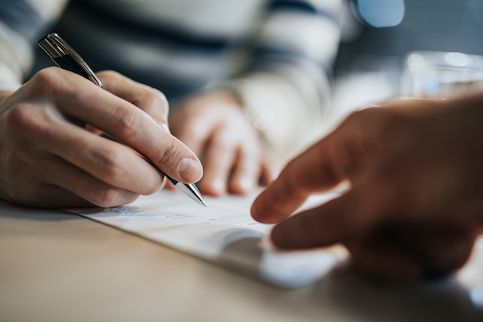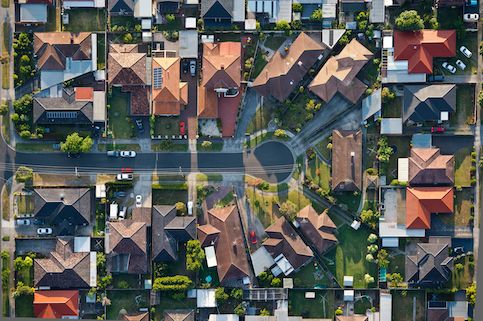When you take out a mortgage loan, you’ll sign a pile of paperwork at closing. One of the most important documents is the mortgage note. This is a document that outlines your agreement with your mortgage lender, including how much you’ll pay each month and what happens if you fail to make your payments on time.
What Is A Mortgage Note?
A mortgage note is the legal document stating the terms of the agreement between the borrower and lender. It will include your loan amount, down payment, repayment term and additional conditions set by the mortgage lender. The mortgage note is signed by borrowers at the end of the home buying process stating your promise to repay the money you’re borrowing from your mortgage lender. This document will list how much you’ll pay each month, when you’ll make these payments and your mortgage’s interest rate.
You might confuse your mortgage note with your actual mortgage. But there is a difference.
The mortgage, which you will also sign during the loan closing, is the document that gives your lender collateral, something it can take possession of if you stop making your payments. In the case of a mortgage, the collateral is your home. The mortgage, then, states that your lender can foreclose on your home, evicting you and taking ownership of the property, if you stop making your monthly payments.
See What You Qualify For
Buy A Home
Discover mortgage options that fit your unique financial needs.

Refinance
Refinance your mortgage to have more money for what matters.
Tap Into Equity
Use your home’s equity and unlock cash to achieve your goals.
Mortgage Note Vs. Promissory Note: Definition
There is a subtle difference between a mortgage note and a promissory note.
A promissory note is a written agreement between a borrower or borrowers to pay back a loan. Any entity that lends money, including mortgage lenders, auto lenders, credit unions and banks, can issue a promissory note.
A mortgage note is a specific type of promissory note in which you agree to pay back a lender for a mortgage loan. All mortgage notes, then, are promissory notes, but not all promissory notes are mortgage notes.
What’s Included In A Mortgage Note?
Here’s what you can expect to see in your mortgage note:
- The amount of your down payment and the principal amount of your loan. This is the amount of money you’re borrowing and must pay back. If you take out a mortgage loan of $300,000, your principal balance is that same $300,000.
- Specifications as to whether the type of loan you’re taking out is a fixed-rate mortgage or adjustable-rate mortgage. In a fixed-rate mortgage, your interest rate remains the same throughout the life of your loan. In an adjustable-rate mortgage, this rate fluctuates over time according to the performance of whatever economic index the loan is tied to.
- Any prepayment penalties. Though they are rare, some mortgages include penalties if you pay off the loan before a certain number of years. Your lender might charge you a penalty, for instance, if you pay off your mortgage within the first 3 years of taking out the loan. Prepayment penalties can vary, but your lender might charge you 2% of your loan balance. If you owe $300,000, that will come out to $6,000. It’s best to look for a mortgage that doesn’t charge prepayment penalties.
- Your monthly mortgage payment and its due date each month.
- The interest rate attached to your loan.
- Spelled- out consequences if you make your monthly mortgage payment late. Typically, the note will say that your lender can charge you a late fee, and state how large that fee might be, if you don’t make your payments on time.
Mortgage Note FAQs
Questions about mortgage notes? Here are answers to some of the most common.
Who holds the mortgage note in real estate?
Your mortgage lender holds the mortgage note until you fully pay off your loan. Once you do that, your lender will send the note to you, along with a notation that your note is paid in full. Often, you will sell your home or refinance to a new mortgage before paying off your mortgage in full. Keep in mind that the mortgage note could be sold or transferred to another servicer on the secondary market. This is a common occurrence. If this happens, the terms of your loan won’t change, your lender will notify you and you’ll receive notice on where to send your payments.
What happens when a borrower defaults on their mortgage?
If you stop making your mortgage payments, you’ll fall into default on your loan. What happens next varies by lender. Your lender might hit you with late fees for missing payments or paying them late. It can also begin the preforeclosure process by sending you a notice of default if your payment is 90 days late. At 120 days, the official foreclosure process stars. It you fall behind on your payments, you should contact your servicer to learn more about your options and if you’re able to avoid foreclosure.
How do I obtain a copy of my mortgage note?
You’ll receive a copy of the mortgage note when you close on your loan. If you misplace this copy, contact your mortgage lender or servicer and ask for a replacement. You can also find a copy of the mortgage note at your local Recorder of Deeds office.
The Bottom Line: A Mortgage Note Is Essential In The Home Buying Process
The mortgage note is one of the most important documents you’ll sign when closing on your new home. This document spells out your agreement with your lender, stating how much you’ll pay each month on your mortgage loan and at what interest rate. It’s important, then, to fully understand the terms of your mortgage note before signing it.
Find A Mortgage Today and Lock In Your Rate!
Get matched with a lender that will work for your financial situation.

Dan Rafter
Dan Rafter has been writing about personal finance for more than 15 years. He's written for publications such as The Washington Post, Chicago Tribune and Wise Bread.












